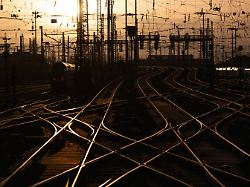4000 kilometers of total closure
Construction marathon aims to save ailing rail network
By Leonard W. Brockes
February 10, 2024, 4:54 p.m
Listen to article
This audio version was artificially generated. More info | Send feedback
This summer, Deutsche Bahn is starting the largest modernization project in its history. Over the next six years, the 40 most important connections in the rail network are to be completely renovated. For thousands of commuters, this means months of substitute traffic with longer journey times.
Over the next six years, Deutsche Bahn (DB) wants to completely modernize 40 of its most frequently used routes. A new, more reliable high-performance network should be created by 2031. The federal government and railways are investing a total of almost 40 billion euros. DB boss Richard Lutz and Transport Minister Volker Wissing (FDP) want to help an important part of the public transport network in Germany out of the crisis.
The need for action is obvious: increasing passenger numbers – by 2030 there should be 29.2 million per day – and the dilapidated rail infrastructure are presenting the railway company with growing challenges. Around every third Deutsche Bahn long-distance train was unpunctual in 2023. There are problems especially on busy routes.
From an overloaded to a high-performance network
The DB rail network covers more than 30,000 kilometers. However, 25 percent of traffic is concentrated on a 3,500 kilometer long rail network. This leads to overloads of an average of 125 percent – and all without any additional hindrances such as construction sites. The general renovation of 4,000 kilometers is intended to significantly reduce delays and cancellations. “80 percent of the quality of the railway system is determined by the rail network,” says DB boss Richard Lutz.
Initially 39.5 billion euros are budgeted for the project. 11.5 billion euros will come from this year’s federal budget and will ensure financing until 2027. A further 12.5 billion euros come from the Climate and Transformation Fund (KTF). The railway itself is contributing 3 billion euros. A further 12.5 billion euros are to be financed through an equity increase. To do this, the railway company could sell its logistics subsidiary Schenker or the federal government could sell its shares in the post office and Telekom, according to the current status of considerations.
Improve instead of mend
With the general renovation plan, DB boss Lutz and Transport Minister Wissing are making a fundamental change in strategy: rail traffic is currently suffering primarily from delays due to many small repairs in various places. During general renovation, however, all necessary construction work should be carried out in parallel. To do this, the affected sections will be completely closed for months. This means that stations, tracks, switches, overhead lines, signaling and interlocking technology as well as level crossings and noise barriers can be modernized at the same time. The routes should then be usable for eight to ten years without any further major construction work.
The first project starts on July 15th. Then the 74 kilometer long Riedbahn between Frankfurt am Main and Mannheim will be closed until December 14th. “The effects of the full closures will be significant for rail passengers,” says Detlef Neuß from the Pro Bahn passenger association. “Long-distance traffic will be rerouted, resulting in longer journey times and possible loss of connections. In local transport, commuters in particular will suffer significantly from the replacement rail service.” From July onwards, 150 buses will be taking over the transport of 15,000 rail commuters every day. Neuß cannot say whether that is enough. One thing is clear: if too many train riders switch to cars, this can lead to increased traffic jams and therefore delays.
After the start of the Riedbahn project, the Hamburg-Berlin and Emmerich-Oberhausen routes will follow in 2025. Five further general renovations are planned for 2026. The project on the Mannheim-Karlsruhe route is scheduled to be completed in 2030.
